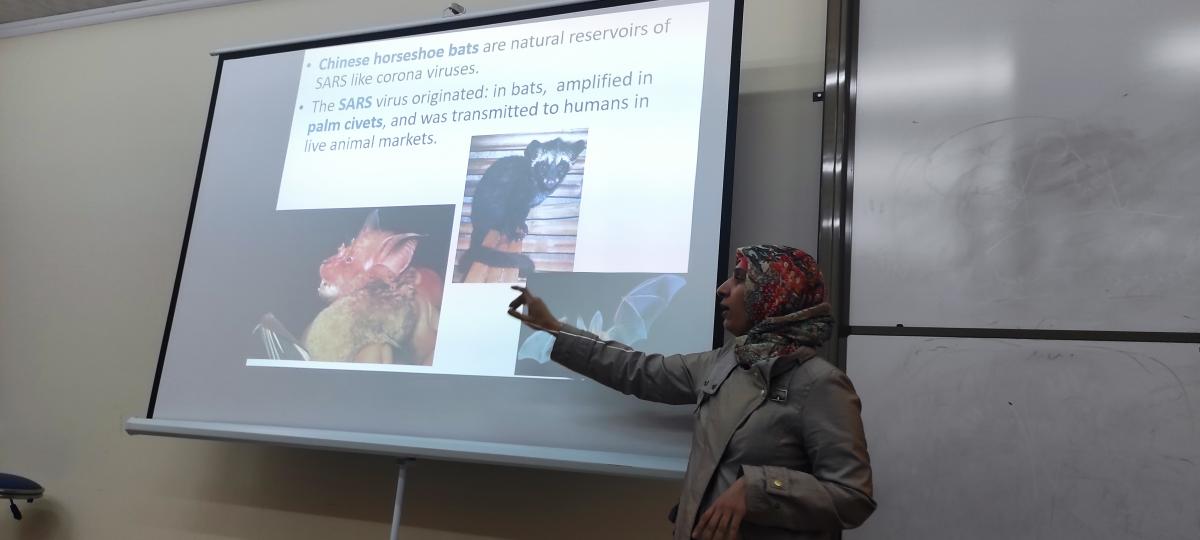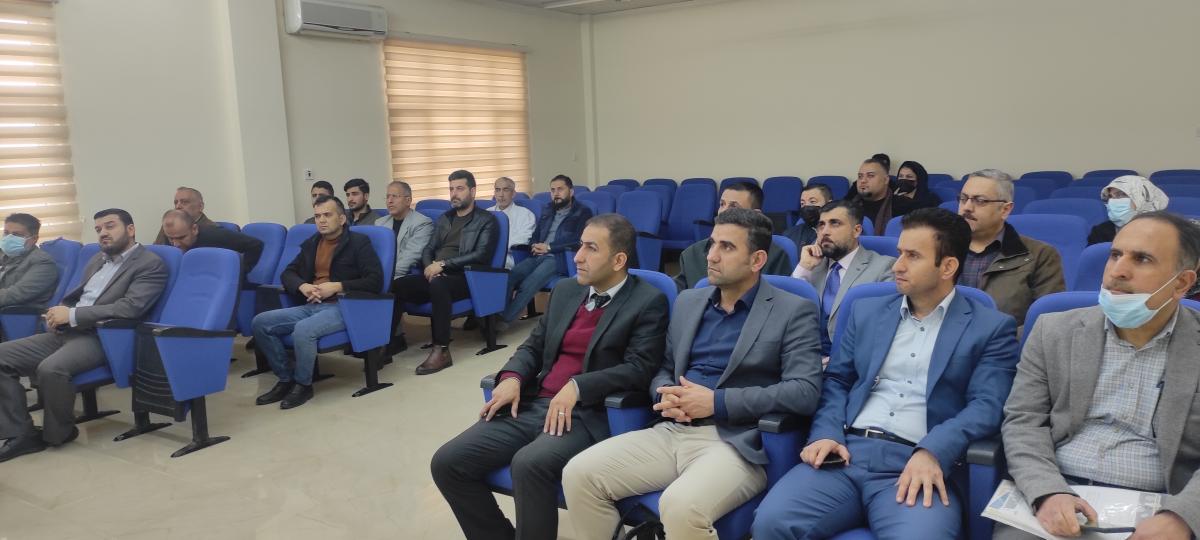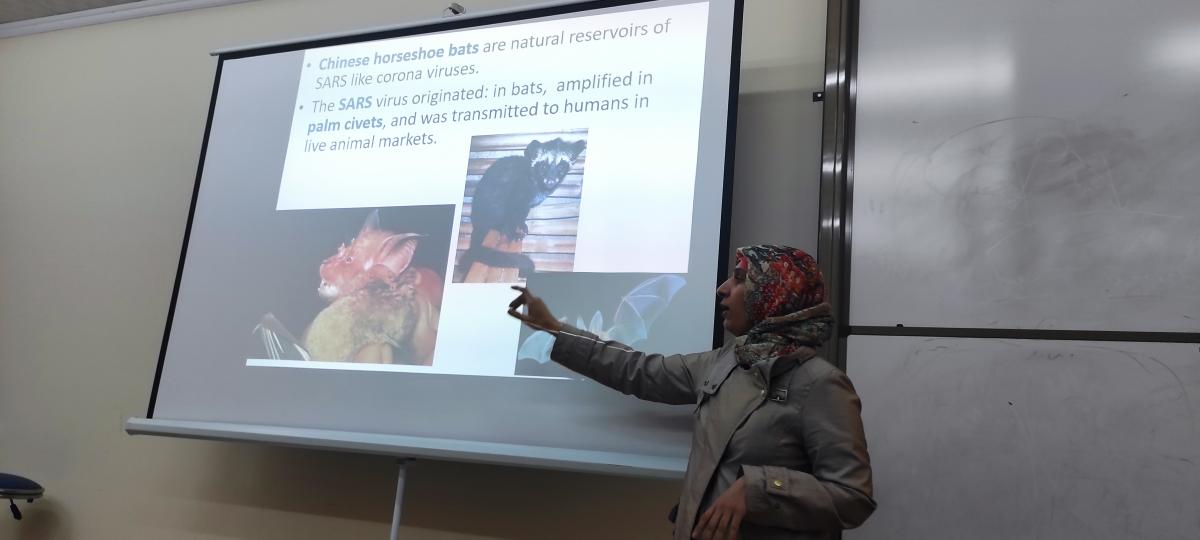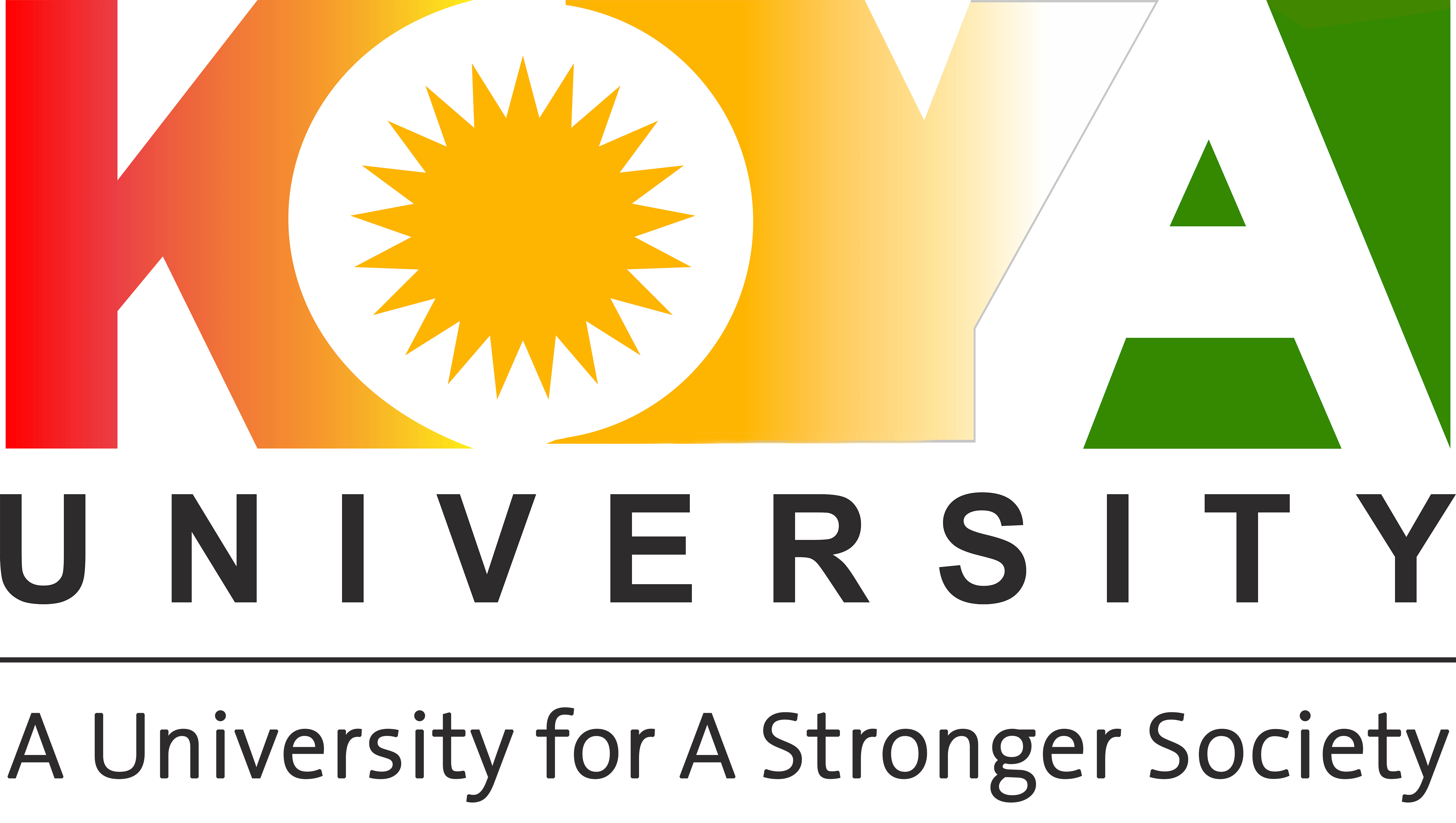Vaccines, which are mostly biological products, save millions of lives each year, as they are designed to prevent disease, rather than treat it by priming a person’s immune system to recognize a specific disease-causing bacteria, virus or other pathogens. Therefore, we need to know what exactly is a vaccine and what goes into making one? And how do we know whether they are safe, or not? In this workshop, which was held by the department of Biology, Faculty of Science and Health, at Koya university on the 3rd of March, 2022, every aspect of vaccines and why they are important for our health including their advantages and disadvantages were explained.
Clinical observations show that the risk of severe illness or death with COVID–19 increases with age, especially in older adults who are at the highest risk. This may be because SARS–CoV–2 spike proteins can weaken the DNA repair system of older people and consequently impede V(D)J recombination and adaptive immunity. Mechanistically, found that the spike protein localizes in the nucleus and inhibits DNA damage repair by impeding key DNA repair protein, for example, loss of function of key DNA repair proteins, such as ATM and DNA–PKcs leads to defects in the NHEJ repair which inhibit the production of functional B and T cells, leading to immunodeficiency. In contrast, a viral infection usually induces DNA damage via different mechanisms, such as inducing reactive oxygen species (ROS) production and host cell replication stress. If DNA damage cannot be properly repaired, it will contribute to the amplification of viral infection-induced pathology. The findings reveal a potential molecular mechanism by which the spike protein might impede adaptive immunity and underscore the potential side effects of full-length spike-based vaccines
For many years, many dangerous infectious diseases were defeated using vaccinations. Unfortunately, there is no licensed vaccine for COVID-19 yet as it's a new disease. There are three vaccines available to protect against COVID-19 disease: Pfizer-BioNTech, Johnson & Johnson's Janssen, and Moderna. In this workshop, some vital points should be put into consideration when taking Pfizer-BioNTech COVID-19 Vaccine since this vaccine was more available for our country. Despite the fact that this vaccine has not been approved or licensed by the U.S. Food and Drug Administration (FDA). It was only authorized for emergency use by FDA under an Emergency Use Authorization (EUA) to prevent Coronavirus Disease 2019 (COVID-19) for use in individuals 16 years of age and older:
- Do not administer this Vaccine to individuals with a known history of a severe allergic reaction (e.g., anaphylaxis) to any other component of it.
- Appropriate medical treatment used to manage immediate allergic reactions must be immediately available in the event an acute anaphylactic reaction occurs following the administration of the vaccine.
- Monitor this Vaccine recipient for the occurrence of immediate adverse reactions according to the Centers for Disease Control and Prevention guidelines
- Immunocompromised persons, including individuals receiving immunosuppressant therapy, may have a diminished immune response to the Pfizer-BioNTech COVID-19
- In clinical studies, adverse reactions in participants 16 years of age and older included pain at the injection site, fatigue, headache, muscle pain, chills, joint pain, fever, injection site swelling, injection site redness, nausea, malaise, and lymphadenopathy.
- Severe allergic reactions have been reported following this Vaccine during mass vaccination outside of clinical Additional adverse reactions, some of which may be serious may become apparent with more widespread use of the Pfizer -BioNTech COVID-19 Vaccine.
- Across a range of vaccinations against other infections, increased age has been associated with reduced vaccine responses.
- Protective antibody responses are higher in females than males in response to a range of vaccines.
- The population data, which was taken in England on the 16th of February 2022, confirms the importance of second vaccine doses and provides strong evidence for the role of individual factors, such as particularly age, sex, prior infection, adiposity and comorbidities, and vaccine type in determining antibody response.
- The large, diverse study population included 26, 683 SARS-CoV-2 test-positive cases with variants determined by S-gene target failure status (16% Delta, 84% Omicron)
When a lot of lives are on the line, it’s hard for health authorities to make decisions. Therefore, the best way to save as many people as possible is to keep up with vaccination programs and help others to keep a safe distance from each other. When you can’t keep your distance, you should wear a face mask, and wash your hands regularly!
The workshop’s details
Title: Advantages and disadvantages of COVID vaccine
Name of Presenters: Asst. Prof. Dr. Hanan Tariq Subhi Baker
The number of participants: 28
Date: 03/03/2022
Location: Health and Science Research Center


-----
Koya University (KOU) is located in the city of Koya (Koy Sanjaq) which is 1.0 hr drive to the East of the Kurdistan Region capital Erbil (Arbil, Hewlér) in Kurdistan Region of F.R. Iraq. It is on the foothills of beautiful high mountain. Its campus has been carefully laid out to embrace the beautiful mountainous nature. . There are 4 Faculties and 2 Schools in KOU; Faculty of Engineering (FENG), Faculty of Science and Health (FSCH), Faculty of Education (FEDU), Faculty of Humanities and Social Silences (FHSS), Shcool of Physical Education (SPHE) and School of Medicine (SMED). Also, there are two research centers; Genome Center and Malai Gawra Center. Moreover, at KOU there is an English Language Center (BELC) at KOU has been opened with the sponsorship of IREX and American embassy in Baghdad as well as with the support of Spring International Language Center of The University of Arkansas. KOU has two Scientific Journals; ARO-The Scientific Journal of Koya University, which is indexed by Clarivate Analytics (ESCI), and Koya University Journal of Humanities and Social Sciences (KUJHSS). KOU is a proactive member of Erasmus/ Marhaba Project and Erasmus+. KOU signed many Memorandum of Understandings (MoU) with many International Universities, e.g., The University of Arkansas (June 2015). The Lulea University in Sweden (April 2014), The University of Nottingham in the UK, The University of Buckingham in the UK (Oct 2008), Belkin University in Turkey (Sep 2009) The University of Greenwich in the UK, Cihan University-Erbil (2021) and Tishk International University (2021). Koya University is a memebr of The Association of Arab Universities and the International Association of Universities.
Arabic Wikipedia | Turkish Wikipedia Iraq | Tukish Wikipedia KRG | Persian Wikipedia | Wikipedia Kurdistan | University of hawai | قائمة جامعات العراق | كردستان العراق | Portugal Wikipedia

